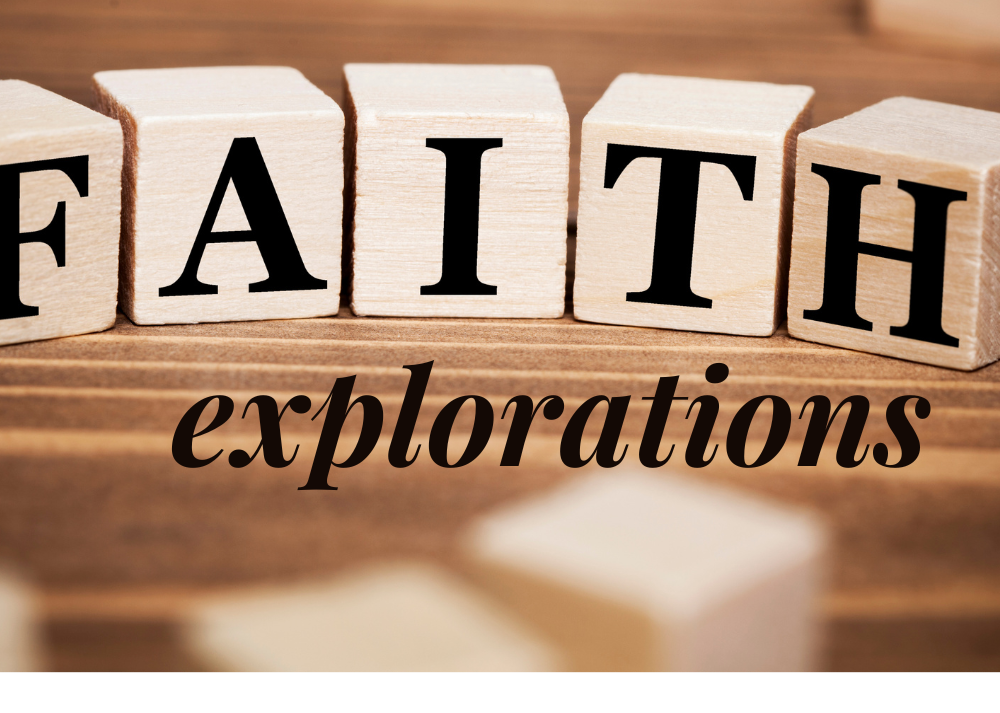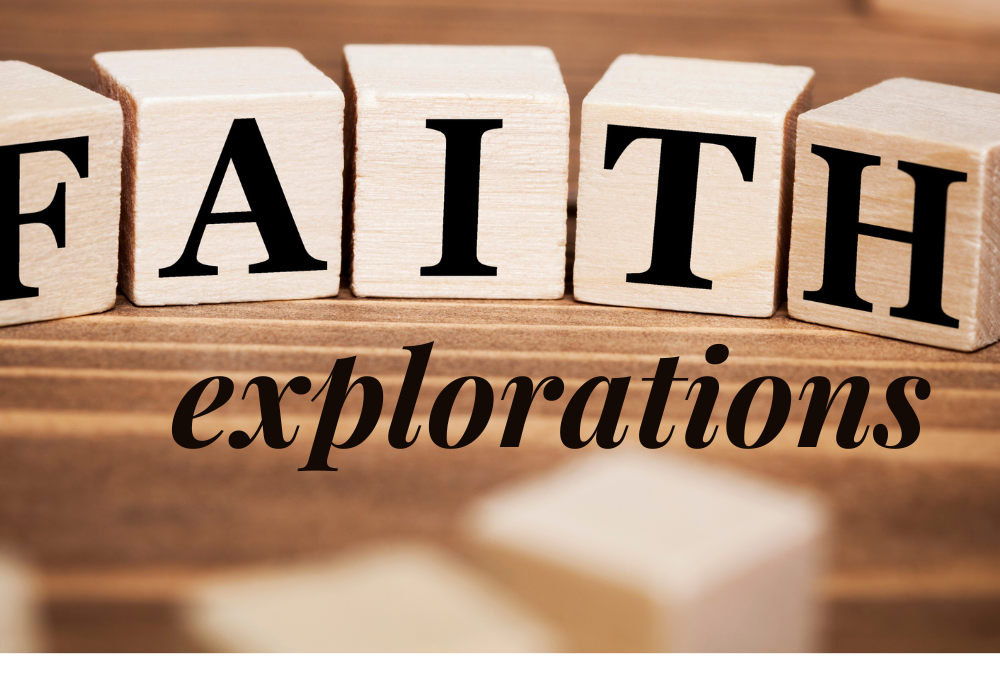
Today’s Sermon focus
Moving from WHAT IF to Faith
Tevye, in Fiddler On the Roof, sings:
“If I Were a Rich Man”
If I were a rich man,
All day long I’d biddy biddy bum.
If I were a wealthy man.
I wouldn’t have to work hard.
If I were a biddy biddy rich,
Idle-diddle-daidle-daidle man.
I’d build a big tall house with rooms by the dozen,
Right in the middle of the town.
A fine tin roof with real wooden floors below.
There would be one long staircase just going up,
And one even longer coming down,
And one more leading nowhere, just for show.
I’d fill my yard with chicks and turkeys and geese and ducks
For the town to see and hear.
(Insert)Squawking just as noisily as they can. (End Insert)
With each loud “cheep” “swaqwk” “honk” “quack”
Would land like a trumpet on the ear,
As if to say “Here lives a wealthy man.”
I’d see my wife, my Golde, looking like a rich man’s wife
With a proper double-chin.
Supervising meals to her heart’s delight.
I see her putting on airs and strutting like a peacock.
Oy, what a happy mood she’s in.
Screaming at the servants, day and night.
The most important men in town would come to fawn on me!
They would ask me to advise them,
Like a Solomon the Wise.
“If you please, Reb Tevye…”
“Pardon me, Reb Tevye…”
Posing problems that would cross a rabbi’s eyes!
And it won’t make one bit of difference if I answer right or wrong.
When you’re rich, they think you really know!
If I were rich, I’d have the time that I lack
To sit in the synagogue and pray.
And maybe have a seat by the Eastern wall.
And I’d discuss the holy books with the learned men, several hours every day.
That would be the sweetest thing of all.
Lord who made the lion and the lamb,
You decreed I should be what I am.
Would it spoil some vast eternal plan?
If I were a wealthy man.
Yes, Tevye had big dreams – if only. And that’s the key word… “if.” The word “if” can raise our curiosity, our sense of wonder, but it can also raise doubt and uncertainty – even temptation. “If” is a key word uttered by the Tempter in today’s Gospel lesson.
After the Spirit drove Jesus into the wilderness, where he spent forty days and nights (reminiscent of the Israel wanderings), the Tempter came and said to him, “IF you are the Son of God, command these stones to become loaves of bread.” A little while later the Devil said to him again, “IF you are the Son of God, throw yourself down…” Still, later, the devil said, “IF you will fall down and worship me, I’ll give you all the kingdoms of the world.”
Do you see what’s happening here? There is a vigorous attempt by the Devil to drive a wedge of doubt into the mind of Jesus. Each temptation invites Jesus to turn away from trust in God in a different way. In the first, the devil invites Jesus to prove his sonship through a display of power; that is, by establishing his validity and worth through his own abilities. In the second, the temptation is to test God’s fidelity (faithfulness). In the third – more a bribe than temptation – Jesus is promised all the power and glory the earth can offer if he will give his allegiance and devotion to the Tempter.
In each case, Jesus rejects the temptation and plants his identity, future, and fortunes firmly on God’s character and trustworthiness. After all, just a few verses earlier – after Jesus was baptized – God’s voice from heaven declared, “This is my son, the Beloved, with whom I am well pleased.” So, after the fact, we cheer, “Good for Jesus! We knew he could do it!”
Then reality sets in, and gazing introspectively at ourselves, we ask, “But could we?” Could we resist the same temptations? And we start rationalizing, “Well, maybe… if we had enough faith…if we were smart enough…if there weren’t so many choices…if we had more money…if we had more control…if people would leave us alone…if we knew God really loved us…”
Again, do you see what’s happening? The big “IF” creeps into our psyche and soul. It’s like a pesky fly you can’t get rid of – it keeps flying back into your face.” The big “IF” is an attempt to erode trust and it is very seductive. It’s no wonder the serpent in the Genesis story today so easily corrupts the man and woman in the garden of Eden. The serpent goes right for the throat, planting a seed of doubt in front of the man and woman.
David Lose, former professor of New Testament at Luther Seminary, now a pastor im Mpls., suggests that this story in Genesis points to what he would call “original insecurity.” For a moment, the man and woman forget who and whose they are – that nesting in the heart of God is enough.
And this gets us to the heart of our own deliberations regarding how we can have meaning in life – whether we rely on the seduction of power, wealth, or our own fortitude – or if we rely on the free grace of God.
In theological circles, we call this the dialectic of Law and Gospel. You see, the Law always convicts us and points out our faults, or what we’re missing in life. To a degree this is a good thing.
We can live in harmony by following the law, we can recognize our shortcomings. The law is often recognized by “if…then” statements (remember the big IF).
“If you stop at a stop sign you will not be hit by a car…if you brush your teeth you will not get cavities, etc.” So, the function of the law is to convict. Remember the use of the word “if” is to indicate circumstances that would have to exist in order for an event to happen. “If you do your homework you will pass the course.” But, the danger comes when we begin using the law to justify ourselves – to give ourselves meaning. “If we live moral life, then God will love us.” “If we gain more knowledge then we will be happier.” “If you go to church every Sunday, then you will go to heaven.” If you eat the apple then you will be like God. It then becomes our god. It controls us.
But the Gospel functions differently. The big “IF” is not a factor. Our response to the gospel is a result of who God says we are. “Because you are mine and I love you…therefore you will love my people.” Your worth is not dependent upon what you do, but because of whose you are.
You do not have to search any further. You are exactly who God says you are!
We are who God says we are. Yes, we’re weak. Yes, we’re vulnerable. Yes, we make bad decisions. And yes, we try to alleviate all of those things by using the big “IF!”
But, we are who God says we are – God’s beloved people. As Tevye says, “Lord who made the lion and the lamb. You decreed I should be what I am.”
We are marked by the sign of the cross, affirming God’s promise of eternal love…no ifs, ands, or buts necessary.
AMEN
Matthew 4:1-11
4Then Jesus was led up by the Spirit into the wilderness to be tempted by the devil. 2He fasted forty days and forty nights, and afterwards he was famished. 3The tempter came and said to him, “If you are the Son of God, command these stones to become loaves of bread.” 4But he answered, “It is written, ‘One does not live by bread alone, but by every word that comes from the mouth of God.’” 5Then the devil took him to the holy city and placed him on the pinnacle of the temple, 6saying to him, “If you are the Son of God, throw yourself down; for it is written, ‘He will command his angels concerning you,’ and ‘On their hands they will bear you up, so that you will not dash your foot against a stone.’” 7Jesus said to him, “Again it is written, ‘Do not put the Lord your God to the test.’” 8Again, the devil took him to a very high mountain and showed him all the kingdoms of the world and their splendor; 9and he said to him, “All these I will give you, if you will fall down and worship me.” 10Jesus said to him, “Away with you, Satan! for it is written, ‘Worship the Lord your God, and serve only him.’” 11Then the devil left him, and suddenly angels came and waited on him.
Service Recording
Sermon at 24:30
Questions to consider:
- Where do the big “IFs” show up in your life?
- What helps you to stay grounded in God’s promises for you? Do you need a reminder from someone? From the Bible? Or prayer?
- What do you think of the idea of the Original Insecurity instead of Original Sin? How does that change the story of Adam and Eve for you?
Join Our Email List
We email prayer requests to the community, along with worship bulletins for online worship, updates on special events, and the monthly newsletter. In general, you can expect about 3-4 emails a week from Celebration Lutheran.

0 Comments